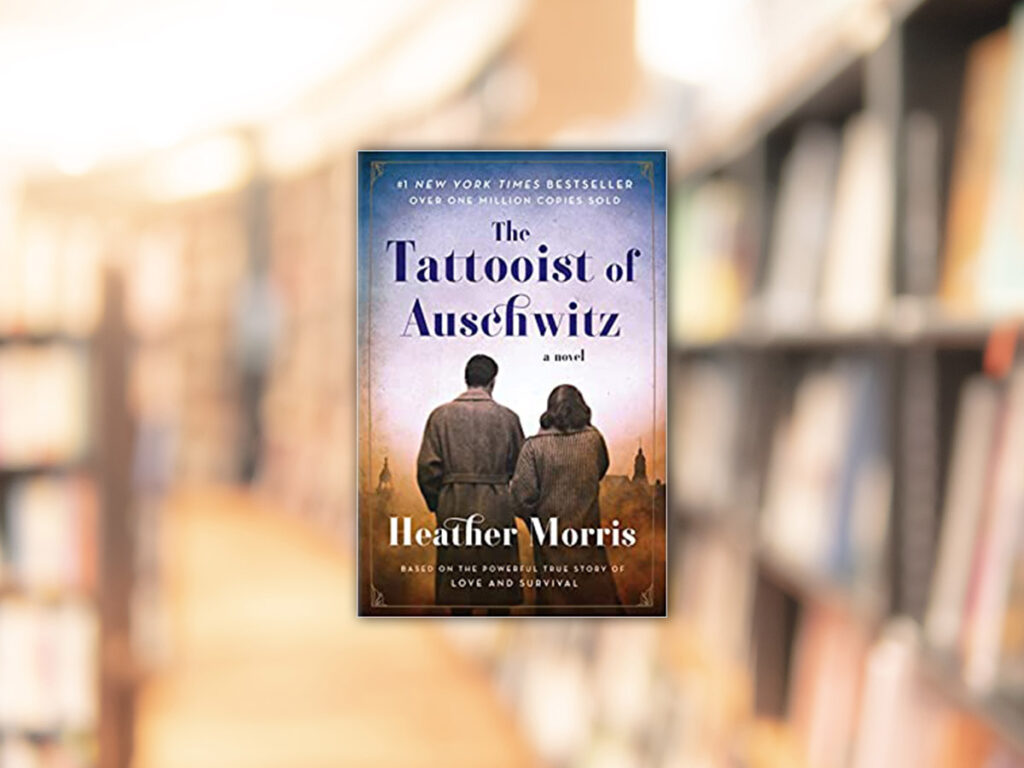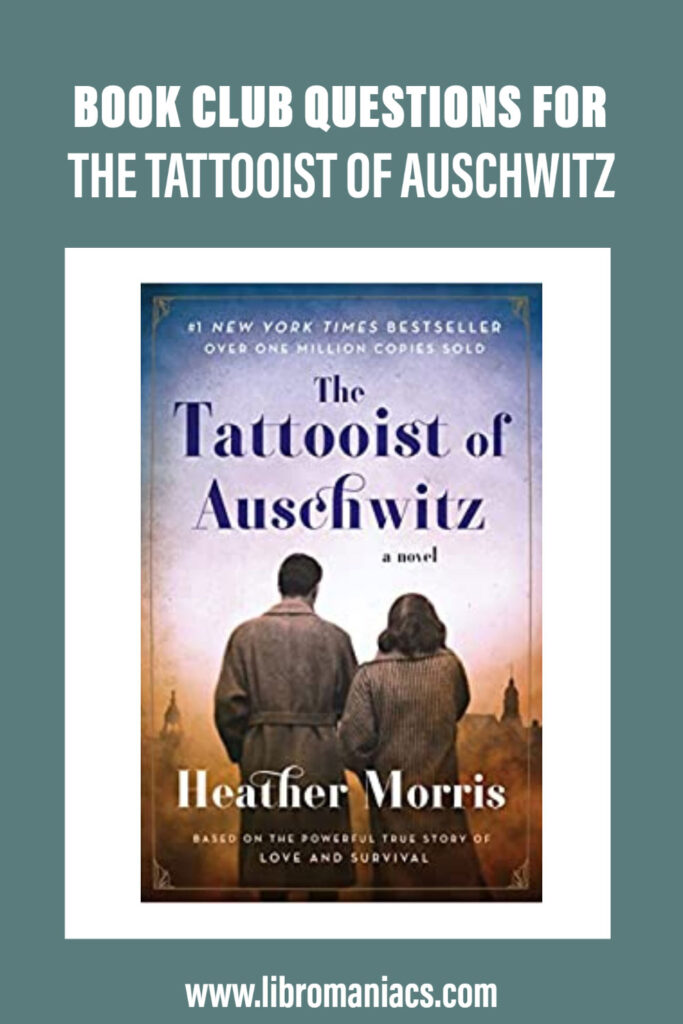The Tattooist of Auschwitz is a story of love, hope, courage, and survival against all odds. This illuminating tale is based on interviews that were conducted with a Holocaust survivor, Ludwig (Lule) Sokolov and it features his unforgettable love and survival story.
The book is focused on Lale’s story and his efforts to survive the waking nightmare of the Holocaust. The Tattooist of Auschwitz is powerful and gut-wrenching, and there is a lot to unpack here with the book’s themes of survival, love, resilience and terror.
Use our book club questions for The Tattooist of Auschwitz to guide your book group’s conversation around this difficult topic. This discussion guide has a synopsis, 10 discussion prompts, some selected reviews for The Tattooist of Auschwitz and three related reads.

(This article contains affiliate links. This means that if you choose to purchase, I’ll make a small commission.)
The Tattooist of Auschwitz Synopsis
The Tattooist of Auschwitz, Heather Morris
In April 1942, Lale Sokolov, a Slovakian Jew, is forcibly transported to the concentration camps at Auschwitz-Birkenau. When his captors discover that he speaks several languages, he is put to work as a Tätowierer (the German word for tattooist), tasked with permanently marking his fellow prisoners.
Imprisoned for over two and a half years, Lale witnesses horrific atrocities and barbarism—but also incredible acts of bravery and compassion. Risking his own life, he uses his privileged position to exchange jewels and money from murdered Jews for food to keep his fellow prisoners alive.
One day in July 1942, Lale, prisoner 32407, comforts a trembling young woman waiting in line to have the number 34902 tattooed onto her arm. Her name is Gita, and in that first encounter, Lale vows to somehow survive the camp and marry her.
A vivid, harrowing, and ultimately hopeful re-creation of Lale Sokolov’s experiences as the man who tattooed the arms of thousands of prisoners with what would become one of the most potent symbols of the Holocaust, The Tattooist of Auschwitz is also a testament to the endurance of love and humanity under the darkest possible conditions.
The Tattooist of Auschwitz Book Club Questions
- There are many dangers that the prisoners face in the camps, what dangers do women face in the camps that the men don’t?
- For instance, Gita’s friend, Cilka who works in the registration building is the only prisoner who doesn’t have a shaved head. Do you think it’s because her main purpose was to be in sexual service to the Commander? What did you think of that relationship? Is “relationship” even the right word?
- What do you think were Lale’s most important personality traits and assets that helped him survive the camp?
- If Lale was considered the protagonist of the story, who was the antagonist? Would Lale’s guard, Baretski, the SS officer be considered one, why or why not?
- Examine the ways that Lale and other victims in the camp must bend their morals in order to survive their ordeal in the death camps. What does this say about their strength of character?
- Lale is granted some perks that other prisoners aren’t granted. And he also helps a lot of different people throughout the novel. Did he use his perks for good? Do you consider him a hero, why or why not?
- “Lale makes a vow to himself: I will live to leave this place. I will walk out a free man. If there is a hell, I will see these murderers burn in it.”
Lale was fortunate to have been helped many times by people within his time in the camp. Who do you think was the most influential person in his survival? Was it Gita and the love he had for her? - How does the book change your perceptions about the Holocaust and war?
- There has been some criticism lodged at the book from the Auschwitz Memorial saying that ““the book contains numerous errors and information inconsistent with the facts, as well as exaggerations, misinterpretations and understatements”.
Does the criticism of the book’s accuracy affect your appreciation of the book? - There are two follow-up books, one with Cilka’s backstory and another following Livia, Magda, and Cibi after the war. Have you read the books? If so, share with your group. If not, what do you suppose is covered in those books?
Selected Reviews for The Tattooist of Auschwitz
“While this book did not dwell on the atrocities of the camp, much to the dismay of many of the readers who gave bad reviews, it did dwell on hope and humanity and the absolute cunning it took to survive, to beat the enemy, so to speak, while at the same time showing a great deal of human kindness to others.”
“This book is an actual account of Lale and Gita’s time in Auschwitz-Birkenau. If you are looking for a novel detailing the countless horrors of the camps there are plenty out there but this is not it. While the book does discuss the horrors surrounding them, the main focus of the book is Lale’s love for Gita and surviving the nightmare they are living […] No matter the writing style or quality, the point of the story is that in the midst of hell on earth love prevailed as love often tends to do.”
“What a waste of an amazing story on an incapable writer. There is no ‘prose’, there is really just “he did this, and then he did that”. No depth of emotion, no depth of characters, heck – no characters! […] The dialogue between characters is ridiculously empty and the whole thing feels like the most superficial experience of Auschwitz possible.”
“So many nightmarish tortures and indiscriminate killings occurred here when the inmates are struggling for survival. Romance of any kind is just not appropriate in this atmosphere. The cruelties of the SS guards are so underplayed that it was difficult to feel any identity for Lale’s circumstances and his priorities.”
3 Books Like The Tattooist of Auschwitz
If your group wants to stay on-theme with the WWII historical fiction, we also have book club guides for All the Light We Cannot See (Anthony Doer), The Diamond Eye (Kate Quinn), The Rose Code (Kate Quinn) and The Nightingale (Kristin Hannah).
We’ve also got a longer list of books similar to All the Light We Cannot See.

The Book Thief, Markus Zusak
Like Morris, Zusak is also an Australian author exploring Germany during WWII. This book really hit a nerve, becoming an international bestseller. The book is set in 1939, and it follows nine-year-old Liesel, who’s growing up in Germany during WWII. She develops a love for words and books, and begins stealing books from Nazi book-burning events. Her family takes in and protects a Jew named Max, and the two eventually became friends.
In a genius (and heartbreaking) twist, the story is narrated by Death, itself. And while that sounds like a gimmick, it actually adds an immense amount of sympathy to the narrative.

Five Chimneys: A Woman Survivor’s True Story of Auschwitz, Olga Lengyel
This is a true story of a woman named Olga who was sent to Auschwitz. Upon arrival she secured work in the infirmary as an physician’s assistant. Later she joined the prisoners’ underground resistance. She helped with the movement to secure enough explosives and blow up one of the five crematories.
Olga was the sole survivor of her family and was able to retell the horrifying events that she endured in the camps and the bravery of the resistance.

Salt to the Sea, Ruta Sepetys
This book is set in 1945, toward the end of the war. 10,500 people are trying to flee the advancing Prussian army. They stuff themselves aboard the Wilhelm Gustloff, a German cruise liner that was supposed to house refugees to safety. But the boat was torpedoed by the Russians in the Baltic Sea, killing most of the passengers.
The book shares the stories of four fictional characters: A Lithuanian nurse, a Prussian soldier (hiding stolen goods), a young pregnant Polish woman and a Nazi with delusions of grandeur.
Have a listen on Audible. Try audio books for free for 30 days.
Share these book club questions for The Tattooist of Auschwitz with your friends:

